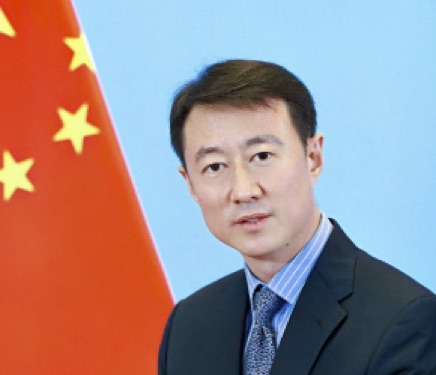By Yu Dunhai
In July this year, the 20th Central Committee of the Communist Party of China (CPC) convened its third plenary session in Beijing, with the adoption of the Resolution of the Central Committee of the Communist Party of China on Further Deepening Reform Comprehensively to Advance Chinese Modernization. The resolution showcases the missions, responsibilities and strong resolve of the CPC Central Committee with Comrade Xi Jinping at its core to see the reform through. The meeting not only bears great significance for China’s development, but also will have a profound impact on the whole world. China is the second largest economy in the world, and its measures to deepen reform and achieve Chinese modernization have attracted great attention and positive response from the international community.
The successful experience of Chinese modernization has enriched the theories and practices of modernization in the world, and provided new insights on the exploration of development paths suited to national conditions for other countries, especially developing countries. Given that modernization originated from capitalist countries in the West, people tend to think that modernization is equal to westernization, and the path to modernization is equal to the path to capitalism. However, the Chinese people learned to “cross the river by feeling for stones”. On the basis of China’s national conditions, we drew on the experience of other countries, continuously deepened reforms and opened up wider, sought coordination between material and cultural advancement, and pursued harmony between man and nature guided by the idea of “lucid waters and lush mountains are invaluable assets”. As a result, we successfully found the path toward socialist modernization under the leadership of the Communist Party of China.
Through the unremitting efforts of generation after generation, China has grown from a poor and weak country to the world’s second largest economy. Nearly 100 million people in China have been lifted out of poverty within the past 10 years through our battle against poverty, and we have completed the arduous task of eradicating extreme poverty, creating yet another miracle in human history. China has had a middle-income group of more than 400 million people, which ranks first in the world, and the country is striving to promote common prosperity for all for its huge population.
In China’s pursuit of modernization and development, reform and opening up complement each other, and it has been China’s successful practice to promote reform and development through opening up. From continuously expanding institutional opening-up to deepening reform of foreign trade system, from reforming the system for FDI and ODI management to improving regional opening-up planning, the third plenary session of the 20th CPC Central Committee further makes a series of reform decisions and proposes, put forward more than 300 important reform tasks in the face of the complex domestic and international situations and a new wave of scientific and technological revolution and industrial transformation. The session emphasizes the guiding role of economic structural reform, and focuses reforms in major areas covering economy, politics, culture, people’s livelihood, ecology and security. The session draws up a blueprint for high-quality development and high-level opening up, demonstrating China’s strong resolve to expand international cooperation, to build new systems for a higher-level open economy, and to cooperate with the world for win-win results and common development in the new era.
The Chinese modernization follows the path of peaceful development.China has been firmly following an independent foreign policy of peace. On our path toward modernization, President Xi Jinping proposes the Global Development Initiative (GDI), the Global Security Initiative (GSI) and the Global Civilization Initiative (GCI), and advocates that we pursue equal and orderly world multi-polarity and universally inclusive economic globalization, put into practice the common values of all humankind, and promote the building of a community of shared future. China is an important member of the family of developing countries, and its high-quality development will surely contribute to the building of a new international relations featuring mutual respect, fairness, justice and win-win cooperation, inject more impetus into world economic growth, and make greater contributions to human civilization.
Nigeria is the most populous country and a major economy in Africa. Boasting ancient history, vast land, ich natural resources, multiple ethnic ationalities, splendid culture and a large young population, the country has great potential in future development. After assuming office, President Tinubu put forward the Renewed Hope Agenda based on eight priority areas covering economic reform, national security, agriculture, resources, infrastructure, education, health and social investment, economic diversification, and governance improvement, which is a testament to the political resolution of his administration to deepen reforms and achieve economic growth.
China and Nigeria enjoy a long history of friendship and have been supporting each other in pursuing national development and rejuvenation. The strategic decisions to deepen reform comprehensively to advance Chinese modernization made at the third plenary session of the 20th CPC Central Committee will bring more opportunities to all countries in the world including Nigeria. Meanwhile, the new summit of the Forum on China-Africa Cooperation (FOCAC) will be held in Beijing this September. President Tinubu will pay a state visit to China and attend the summit. We would like to take President Tinubu’s visit as an opportunity to deepen experience sharing on governance and to synergize our development strategies under the frameworks of the FOCAC and the Belt and Road Initiative (BRI). We will deepen our cooperation in such areas as industry, agriculture, infrastructure, financing, poverty reduction, technological innovation, digital development and blue economy, and work to boost investment and employment in Nigeria, so as to further enhance the sense of fulfillment, happiness and security of our two peoples.
•H.E. Yu Dunhai is Chinese Ambassador to Nigeria
